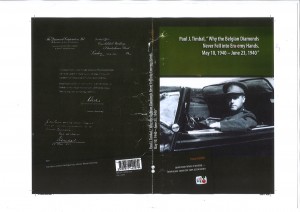‘Why the Belgian Diamonds never fell into enemy hands’ Bruno Comer tells us about this new book
November 16, 2014
The Royal Commission of History has just published ’Why the Belgian diamonds never fell into enemy hands’.
On 11 May 1940 Paul Timbal, managing director of the Antwerp Diamond Bank, fled the Diamond Quarter in Antwerp with a fortune in diamonds and on 23 June was able to deliver his charge to the Diamond Corporation in London. In those six chaotic weeks, he traversed France from Valenciennes to Cannes and from Paris to Bordeaux, besides flying to London and back. Few travelled the area behind the front line so extensively.
The account that he wrote of this is fascinating in its interest. In 1976, Countess Plater-Zyberk described it as “passionnant à lire” and found it worthy of being filmed . The countess herself is the daughter of Albert Eduard Janssen, the first president of the Antwerp Diamond Bank and in 1940 a top figure in the Belgian and international worlds of finance .
The account stands out in the first place through its comprehensiveness. Indeed, few written accounts of the exodus of 1940 appear to exist; according to the British historian Hanna Diamond, there is an obvious reason for this, in that no-one has been eager to write about an unexpected and painful defeat to which an entire population fell victim . That attitude found expression in the statement by François Mitterrand in his book L’Abeille et l’architecte: “J’ai vécu 1940: inutile de dire davantage” (I experienced 1940. It is pointless to say more) .
Paradoxally enough, the three hundred pages of the account underpin Hanna Diamond’s view. It was not because Timbal was a Belgian for whom the defeat was less humiliating than for a Frenchmen that he was able to unfold such a comprehensive story, but rather because he was able to write about a success. Contrary to the fate of similar expeditions, such as the flight with Belgium’s gold or that with the securities of the Kredietbank , which ended so lamentably, the outcome of Timbal’s peregrinations is a happy one. His account is one of an exception that proves the rule. The title of the work, Why the Belgian diamonds never fell into the enemy hands, makes it plain.
The most spectacular part of the book comes at the end with the dangerous crossing on board the Broompark, which was carrying not only diamonds, but also ‘heavy water’ . That journey formed a notable event in the history of the Britain’s Merchant Navy and many sources make mention of it, particularly books on the history of French nuclear science and on the history of the Merchant Navy in the Second World War . The crossing is also mentioned in the memoirs of de Gaulle , Harold Macmillan and Herbert Morrison , and in popular histories, too . However, the information about that crossing in the Broompark is summary, vague or even wrong. Timbal’s is the most detailed description that exists of the voyage and indeed provides fresh information about the history of atomic energy and of British merchant shipping in wartime. The story of the sea passage transcends mere anecdote and offers a foretaste of the ability to improvise that the British were to exhibit during the period that Churchill described as “our finest hour”. Nevertheless, those involved were not inclined to wax lyrical about the crossing, as exemplified in the memoirs of the British Labour politician Herbert Morrison (1888-1965), published in 1960. Morrison was Minister of Supply from May to October 1940 and he described the task given to Lord Suffolk (the leader of the expedition) as “a fantastic assignment”. There was an instant response from Colonel Golding in a letter to the Sunday Times of 27 March 1960. Golding who, as a major in the British Secret Service, was one of the leading figures on the Broompark, played down the epic character of the voyage: “I’m sure Lord Suffolk, if he were alive today, would wish me to say that the task, though interesting and unusual, was not ‘fantastic’ and was no more dangerous than any routine evacuation under the conditions”. The particular nature of the Broompark’s cargo and the colourful character of Lord Suffolk had apparently given an avant la lettre ‘James Bond’ allure to the story and Golding was rejecting that.
This fascinating book is now out! It can be ordered at the price of 25 euro (+ mailing costs) from bruno.comer@skynet.be
Bruno Comer, Damme, Belgium
